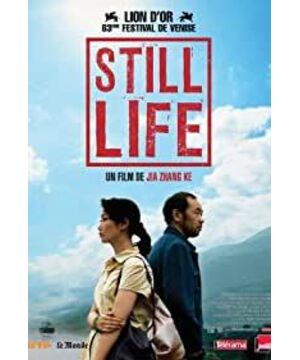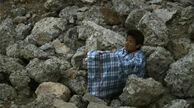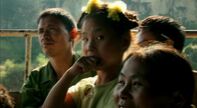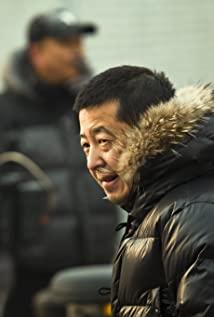Still is a polysemous word in English. When used as an adverb, it means "still, still, still". So I thought at first, to translate this film as "life is still" or "life, but so". It is also appropriate.
A man in Shanxi who lived on coal in Xiaohei Mine spent 3,000 yuan to buy a daughter-in-law from Sichuan 16 years ago. He was rescued by the police after giving birth to his daughter. The daughter-in-law took her daughter back to her hometown in Fengjie, and it took 16 years. A man who is as dumb as a lump of wood will also miss his wife and daughter, but he can't think so much. He travels thousands of miles, mountains and rivers all the way to find it; the 16-year-old address has been submerged under water. ——The dam was repaired, the water rose, the city was demolished, and the daughter-in-law went on a boat. He just waits.
For such a man, there are only two things in his life, one is time, and the other is a bunch of strength.
He took a sledgehammer, demolished the house in Fengjie City, and waited for his daughter-in-law. My daughter-in-law is back, but she can't leave. Her mother's brother owed the boat boss more than 30,000 yuan and mortgaged her. The man responded without hesitation: give me a year. I still! He wants to go back to Shanxi again, and go to the Xiaohei Mine to carry coal, because he can make money quickly.
For such a man, he has nothing. Only time and a handful of strength.
This is the main line of "The Three Gorges". Another story about finding a husband is starring Zhao Tao. Zhao Tao is a good actor, simple and not humble, and his temperament is a bit like Chen Jin. But in this film, which uses almost all non-professional actors, I always feel that she is still a bit out of place, and her eyes and even her back look a bit dazzling. Because there is no opponent.
I have read Jia Zhangke's "Xiao Wu" and "The World". "Ren Xiaoyao" was swept through in a fast-forward manner, and "Platform" has not been finished yet. Watching his movies, I can especially feel that I am from Jiangnan. Nothing else, his movies always remind me of Shanxi vinegar, that kind of strong acidity without neutralization of sweetness, astringent and even spicy, like wine; it is not as good as Jiangnan vinegar, which is slightly sweet. But for his choice of topic, I maintain a respect. At least he is not mercenary, chasing investors, or chasing the box office.
The time point of Jia Zhangke's films is nearly ten years. This is the decade with the most chemical effects in China's 5,000-year history of civilization. All of them, in the process of reaction, produce various forms of impact and release various forms of energy. Second is location. Jia Zhangke himself came from the county seat of the Central Plains. This is the location for most of his films. The Central Plains, the middle ground of China. The county seat, the middle ground between rural and urban areas. These are the core places where various civilizations, such as social, economic, political, spiritual, etc., have clashed in China in the past ten years. One is the loess civilization, and the other is the marine civilization. Then there's the protagonist. Xiao Wu is a thief; the two boys in Ren Xiaoyao can be regarded as "A Fei" and eventually turned into "bandits" after robbing the bank; the men and women on the platform are more vividly called "Grass Terrace Team"; Zhao Xiaotao in "The World" is similar, it is the past "Running the rivers and lakes". These most grassroots people are vivid in Jia Zhangke's films, but he never makes them vivid; they are just vivid grassroots.
My growth is not grassroots. So in the past, when it came to people's livelihood, I would pretend to be so-called humanism, and play a little bit of petty bourgeois emotion, just like dipping some tender white sugar in vinegar. But Jia Zhangke still used his expression to make me accept a dish of Shanxi aged vinegar. Life is like this sometimes, no sugar, but it doesn't necessarily mean suffering. Jia Zhangke is trying to express this. Therefore, his films are neither scarred nor demoralized. They do not mourn their misfortunes well, nor do they sully anger them. The first step in realism is to face reality, whether you accept it or not. I think this is also Jia Zhangke's character. It is also the change in my temperament after I turned 30. Facing, sometimes requires greater responsibility and courage than change.
A few days ago, I watched Jia Zhangke's TV interview, and something really touched me. He said: The Three Gorges is a river and lake. There are people coming and going, and the pier is wandering. So at the beginning of "The Good Man in the Three Gorges", Jia Zhangke gave us such a long shot, the passengers on the ferry, men and women, old and young, happy and sad, like a long scroll -- people.
Watching "The Good Man in Three Gorges" reminded me several times of Guo Degang's "On the Fifty Years of Chinese Cross Talk". Like the migrant workers in "The Three Gorges", they are also hard-working people. Guo Degang calculated the daily running account for them, which was the grassroots economics and sociology of old China. (This paragraph is too impressive, so I simply wrote it out and broke it.)
At that time, there was a people's market called Shanjiankou next to the overpass (which is equivalent to today's labor market). Every day is bright, and the strong laborers of the four cities in Beijing will come together to wait for the work. Anyone who has heavy physical labor such as unloading truck skins and carrying sandbags will send an intermediary to pick people. It takes half a day for a trip to exchange two oceans. I walked from Sanjiankou at seven or eight in the morning, and worked in one breath until one or two o'clock in the afternoon without a break. Then I collect the money and go to work, and I don't take any jobs anymore. why? Guo Degang said it very well. "Two dollars is enough to live!" (Enough to live! These four words, if Lu Xun said it, may be the most important block in his heart. As soon as Guo Degang said it, it was a light weight. That's right. Who is alive? Not all day after day. For these laborers, there are two different things in their hands every day—time and physical strength.) The laborers who returned to the overpass with two dollars in their hands must have found a small bath to take a dip. , asked the guy to go to the roadside stall to make a dime of wine, and asked for two cents of fried meat with fungus and half a catty of noodles. After taking a shower, making a pot of tea, the meal will arrive. Wine is not good wine, food is not good food, and tea is not good tea. But that's all it takes. Just stew two mouthfuls of small wine with fungus, and eat it hot with broth and noodles. full! Take a few sips of tea and fall asleep for half an hour. Most of the stamina that was sold throughout the day came back. Then go out and walk around the flyover with your sleeves up! Watch acrobatics twice, aim for a trick, and then take a few direct glances at the diorama. If you don't rub it for nothing, if you see it, you will throw three points and five points. When it gets dark, I will buy two bowls of bean juice for a dime, and it's another meal. Seeing that the sky was getting dark and the market was closed, I picked cheap ones to buy a cabbage for my wife and children and bought two catties of stick noodles. If I had more money, I could bring more than half a catty of white noodles. The stick noodles can be steamed with wotou, and the white noodles can be boiled in lump soup. By this time, there are only three cents left in the two pieces of ocean in the pocket. If you don't go home, you will definitely have to take 20 cents to go to the Tianqiao Theater seriously and listen to the play sung by the corner. This was the most vibrant and decent nightlife for the bottom men in China back then. After listening to the play and going home, I bought vegetables and noodles for my daughter-in-law, and the family had a place in the next day. Covering his head and sleeping in the morning, he ran to the mountain and the mouth again, took the last dime left over from yesterday in his pocket, bought half a catty of pancakes, and asked the pancake master for a bowl of frothed oil slag soup, after eating and drinking After finishing, I put my sleeves up and waited to work hard...
How vivid! When I listened to Guo Degang talking about this passage, I always felt that these laborers were all flesh and blood; this time I watched "The Good Man of the Three Gorges", and they appeared in front of the camera one by one with their souls possessed. The cross talk, folk art, martial arts, and acrobatics under the flyover turn into magic tricks on the ferry, old-fashioned Hong Kong police and bandit movies, and rock and roll performances by grassroots groups, which also entertain migrant workers who have sold their strength for a day. Equally vibrant and steaming. As for their "economics", the film has a particularly brilliant performance. The fellow from Fengjie humbly took out a piece of ten yuan and said to the man from Shanxi, "Our family is on money, you see, this is Kuimen." Shanxi man also sincerely took out Zhang fifty yuan and said, our family is also on the money, you see this is Hukou Waterfall. So the fellow Fengjie villagers expressed enviously: Your hometown is beautiful! (I don't know if they envy Shanxi's scenery is on the back of fifty yuan, and Kuimen is ten yuan.) I think most urbanites, if they are not from these two areas, may never regard themselves as hometown for such economic ties. But they will, in a direct and unadorned way, express the intimacy between their hometown and them. The hometown is so self-conscious to them. This scene corresponds to Guo Degang's running account, which I think is probably the current grassroots economics and sociology in China.
When it comes to sociology, interspersed throughout the play, there are also four words "tobacco", "wine", "tea" and "sugar". This is a special public relations agency for Chinese people. A cigarette can break the barrier between a stranger and a strange environment; a bowl of wine can make a vow about a man's entire net worth and dignity; a cup of tea can brew all the infinite yearning for a leisurely life and real life Trivial; and a candy - is the most grass-roots intimate token, which can represent brotherhood and love between husband and wife. These are the four tokens of grassroots.
While watching the movie, I always thought that the Three Gorges Dam project triggered another organized large-scale migration of human beings, so there should be cultural thinking. Just like the ancient city of Fengjie, houses, streets, cities and all traces of past life will be submerged under water. There is a line in the movie that shocked me deeply, "A city built for more than 2,000 years has been demolished in 2 years." There is also a scene that made me sigh, the ancient city of Fengjie, which was demolished by the archaeological team. Another shovel found the ruins of the Western Han Dynasty.
200 BC, 2000 AD. time, that's all.
There are also posters of Jay Chou on the walls of the houses that were dismantled into frame structures, which will also sink to the bottom of the water with the city that stopped construction in 2000 AD. And people left singing pop songs. Scattered all over the world. The old life has been changed, and the new life has to go on. The chaos will quiet down like running water and flow through. I like the little boy who sang "Mouse Loves Rice" and "Two Butterflies" in the play; that person imitated Chow Yun-fat's "Little Pony" indiscriminately. They represent grassroots adolescence and boyhood. They consume popular culture and civilization in a grassroots way. Will they still be as gentle and dull as their fathers? I have no idea.
As I write this, the night is dark and everything is silent. Suddenly thought of another meaning of Still. As an adjective, it is "silent". Still life. Silent life. This is probably the original ecology of life. There was no great sorrow, and no great joy.
I should still thank Jia Zhangke for this topic. In the hustle and bustle of the film and television industry, you can calm down and record this moment.
The monkeys on both sides of the strait could not stop crying, and the light boat had passed ten thousand mountains.
View more about Still Life reviews









